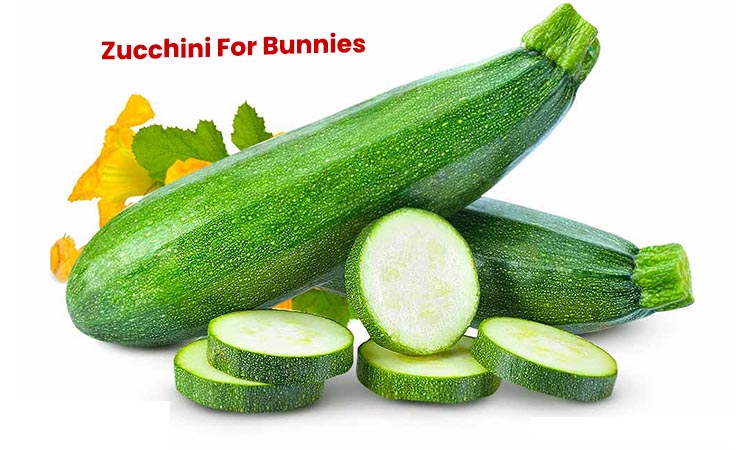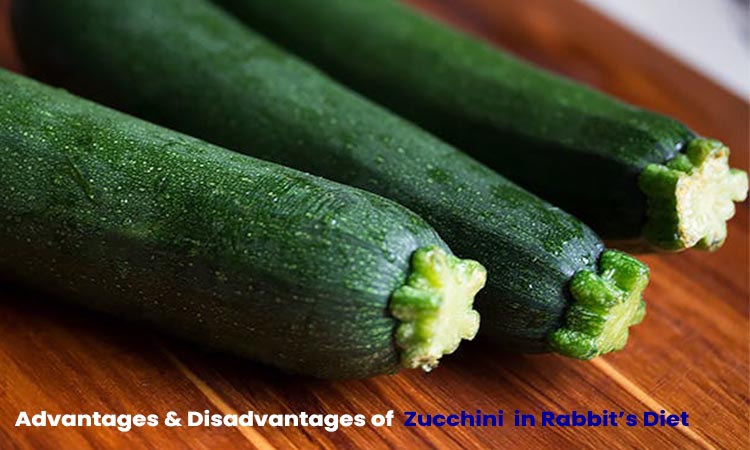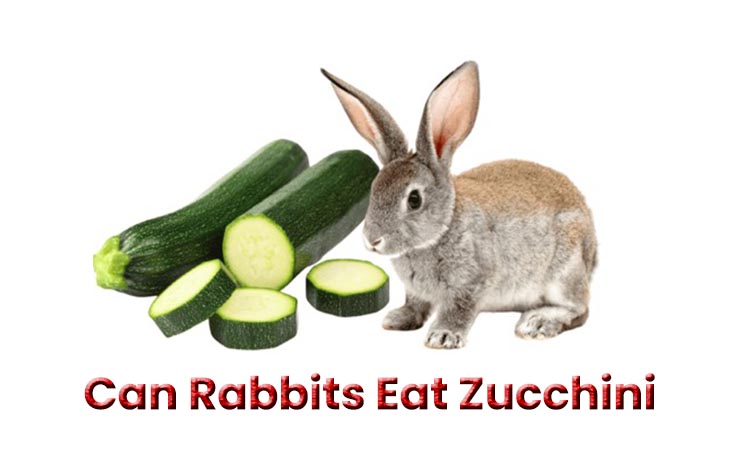Rabbits are cute animals kept as pets that love to live in many homes interacting and charming people with their cuteness and playful nature. One good diet goes a long way in fostering the overall health of these rabbits. Being herbivorous animals, they are fed mostly on hay, fresh veggies and little pellets. Since there are a variety of vegetables, which, if eaten will make sure that all the essential nutrients are provided.
One common concern amongst rabbit owners is the question “Can rabbits eat zucchini?” Zucchini, since it is bland in taste and contains many nutrients, is consumed in many human meals. However, this vegetable fits nicely in the diets of some of our pets.
In this blog, we will consider – whether is zucchini safe, whether is zucchini nutritious for rabbits and what notice should be given to the risks and benefits associated with feeding zucchini to rabbits. So, we want to persuade you that all these factors can help you decide what is best for your rabbit and its diet.
Can Rabbits Eat Zucchini?
Yes, rabbits are allowed to consume zucchini, however, care should be exercised to limit its intake to acceptable levels. It belongs to a group or category of vegetables which has low calorie and high fluid absorption. Zucchini contains various types of vitamins and nutrients, which are very beneficial. In addition, specific types of summer squash contain fiber, which can be beneficial in the digestive system and eliminate other complications that may arise in the digestive tract.
In the case of zucchini, Only a small size should be provided at a time, especially if it is for the first time, to see whether the rabbit enjoys and digests its ‘resting’. Wash the zucchini properly before and after feeding it to the rabbit. Both the skin and the inside portion of zucchini are meant for rabbits as well, but it is quite impossible to give them such food only. Instead, hay, greens and a limited amount of pellets must be included in the diet.
Check how your rabbit reacts when you slowly grant it a small piece of zucchini. If they show no signs of illness, it’s possible to give such treats further. As has already been noted, moderation is essential and so is the case with these treats for rabbits.
Nutritional Benefits of Zucchini
Despite the restriction in zucchini quantity, there are numerous nutritional benefits associated with this food that make it worthwhile for the rabbits’ diet. To begin with, zucchini is low in carbohydrates and high in moisture content thus helping in the hydration of the rabbits.
It is also a good source of vitamins such as vitamin C and vitamin A. Vitamin C enhances the body’s immunity and health while vitamin A is useful for eye vision and skin health.
Besides, zucchini contains dietary fibers which are critical for digestion. Teeth ground food substances help digest food smoothly thus preventing bowel problems like gastrointestinal stasis and constipation. The dietary fiber of the zucchini may, rather assist in enhancing the motility of the intestines.
Zucchini has also minerals like potassium that aid in fluid balance maintenance and enable the muscles and nerves to work properly. Because of the presence of vitamins, fiber and minerals in the diet vitamin powder, you may be sure of good health for your rabbit. However, the preparation should be served at intermittent juicing to maintain balanced nutrition for your remedy.
How to Feed Zucchini to Rabbits
When properly administered, consuming zucchini can be an effective way to enhance the health of rabbits. Start by obtaining good quality, organic zucchini then wash and clean it to ensure all pesticides and contaminants are removed. It is advisable to cut zucchini into small pieces as it makes chewing and digestion easier for your rabbit. Both skin and flesh of zucchini are safe to feed but avoid giving your rabbit seeds or tough parts.

To do this, start with just a tiny piece of the zucchini and see how your rabbit behaves. The transition of changing diets is usually formed well to avoid any stomach upset. If your rabbit likes the zucchini and does not show any stomach upsets, you can continue giving it to her from time to time. It should thus be offered in moderation and more than two times a week but less than every other day making sure the rabbit’s hay, pellets and fresh green vegetables remain in the right proportion.
Any slight change in behavior such as how much food and water they consume, as well as how much droppings are produced should always be looked into after any new food is introduced into their diet. Adhering to these instructions enables you to add zucchini to the diet of the rabbit without much trouble improving the selection of treats but most importantly promoting the health of the rabbit.
Also Read - Can Rabbit Eat Spinach? Find Spinach Nutritional benefits, how much quantity to feed & more info.
Advantages of Zucchini for Rabbits
Zucchini has several advantages that benefit rabbits as long as it is given in moderation. One of the primary benefits is its low calorie content, which makes it a suitable treat for rabbits needing to maintain a healthy weight. Zucchini is also rich in water content which helps to keep the rabbit hydrated, which is very important as far as their health and even more so their digestion is concerned. Correct water intake could help keep many body functions in order while also preventing dehydration.
Also, they contain a lot of much-needed vitamins including vitamin C and vitamin A. While vitamin C helps to fortify the body, vitamin A assists the body in developing good vision, healthy skin and a strong immune defense system. Such nutrients encase the rabbit’s overall health improvement.
The supplement of digestive fiber is another advantage that may be derived from the zucchini. Dietary fiber is an important aspect of a healthy colon, reduces the chances of constipation and ensures the colon moves in a healthy way. While the combined water and fiber content in the zucchini aids in the digestion of your rabbit.
In addition, serving “zucchini” hay shake appears quite functional because it creates some culinary variety and introduces nutrients into the diet without excesses. Just make sure that it is given in small amounts and together with hay, vegetables and pellets as usual.
Disadvantages of Zucchini for Rabbits
When feeding zucchini to rabbits, health benefits can be realized, but some cons ought to be taken into account. There is the concern, for instance, of possible digestive upsets. Rushing with the integration of zucchini and any other food might upset the rabbit’s normal digestive system and may result in diarrhea or gas. The rabbit has a delicate digestive system hence, it is important to change the diet of the rabbit in stages.
There is a problem with zucchini as well. It does have some fiber but it does not have enough of it which will be found in hay or dark green vegetables. Overfeeding of zucchini can lead to a lack of sufficient diet fiber, which is critical to the rabbit’s health. This clinically has shown that overfeeding on zucchini predisposes the rabbit to some depression and constipation. Moreover, due to the fact that zucchini is also watery, overfeeding can upset the good distribution of the nutrient ratio with that of the rabbit.
Zucchini may also contain pesticide or chemical residues in their feces if they are not cleaned thoroughly. Make sure it has been rinsed properly and most preferably, organic so that there is no possibility of damage. Zucchini is highly unlikely to contain all the nutrients that the rabbit diet requires. It is to be given as a snack once in a while but not on a regular basis so that this will help your rabbit take a balanced diet that would cover hay, greens and pellets.

Food That Can Replace Zucchini
If you want to move beyond zucchinis for providing veggies for your rabbit then there are a number of other healthy treats as well as veggies you are free to use as well. These include the following:
Carrots: Among the favorite vegetables for rabbits, carrots also have a crisp and crunchy mouth feel. They are packed with Beta-carotene, which converts to vitamin A, which supports healthy sight and a strong immune system. Cut them into an inch long or smaller portions to prevent excessive feeding.
Bell Peppers: Bell Peppers, especially the red, yellow and orange varieties, are vibrant, low-sugar foods that are high in vitamin C. These peppers are nice and easy to chew, as well as great color variation in your rabbit’s food.
Cucumbers: Cucumber’s caloric value is low while it consists mainly of water, making a tasty and refreshing low calorie treat. Cucumbers are also good for the stomach.
Leafy Greens: Cold climatic leafy greens like romaine lettuce, kale, and parsley, etc., are great alternatives. They are fiber-rich foods that furnish the body with vitamins and minerals.
Broccoli: Broccoli florets are an excellent source of vitamin C along with high fiber content. Though vegetables like broccoli should be limited in the diet since they can cause gas.
Celery: You can include celery in your bunny’s list of food because it is another low-calorie food that is crunchy. It is very watery and contains a lot of fiber but do not forget to chop it into bite-sized pieces.
Squash: There are also summer squashes such as yellow squash that can replace or serve as an alternative to zucchini. They contain little calories as well as some vitamins and minerals.
Therefore, it can be concluded that with the presence of these alternatives, offer your rabbit other foods with different flavors as they are no longer using too much zucchini.
Also Check - Can Rabbit Eat Plums?
FAQ
Is zucchini safe for rabbits?
Zucchini is considered safe with small amounts for rabbits as the pet tamed animals can enjoy this vegetable. It aids water supply and some significant nutrients without the extra calories that it can offer.
How much zucchini can I give my rabbit?
Slice zucchini into small bite sizes, and feed 1-2 times a time a week to help the pets avoid excessive eating. Counting portions is crucial for balanced feeding.
Can baby rabbits eat zucchini?
Baby Rabbits would be better off without any encouragement to eat zucchini. They are still in the stage of maturing navigated by the stomach and complications brought by such changes are far inevitable.
Can zucchini cause digestive problems in rabbits?
Such safely introduced food shall be done slowly over a period of time as excess and or too soon blending with the late grass will cause diarrhea and or stomach upset for the food on rabbits.
Can zucchini be mixed with other vegetables for rabbits?
Yes, Zucchini may be added with other pet vegetables as carrots and bell peppers as well as lettuce so as not to bore the bunny with her diet.
Can rabbits eat zucchini if they have a sensitive stomach?
If your rabbit is prone to this problem, rushed introduction of zucchini should be avoided and its giving begins very gradually. Seek veterinary advice if any problem is noted.
Conclusion
Zucchini is safe and will offer many health benefits when served to the rabbits but will require that it be done in limited amounts. The vegetable has low calories, a high water ratio, and Contains Vitamin C, Vitamin A, and Dietary Fiber, which all help build up a rabbit’s diet structure. Nonetheless, it is critical to firstly feed zucchini in small amounts asking these questions so as not to cause stomach upset to your rabbits. As a rule, whenever the zucchini is given out to rabbits, it is very important to wash it and chop it into small steaks to make it healthy for the pet.
Incorporating zucchini into the diet of the rabbit can be tricky, however, and they should be treated as treats and not everyday food. A pleasant diet, which consists mostly of hay with some fresh greens and only a little pellet is very important for the proper health of the bunny. By bearing these tips in mind you will be able to incorporate zucchini into your bunny’s diet as one of its meals without worrying about any side effects.


